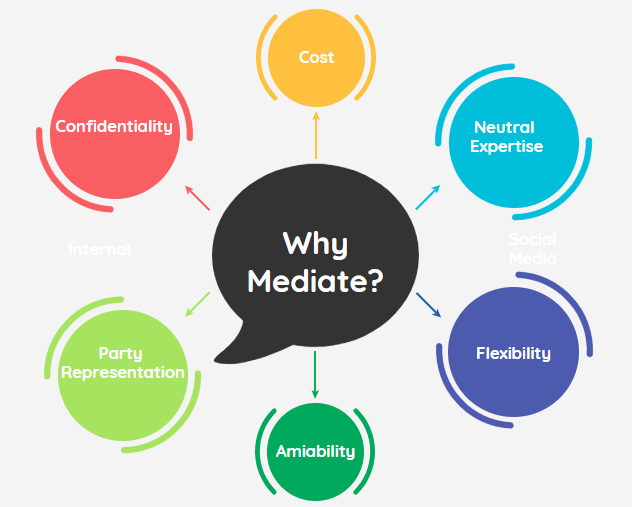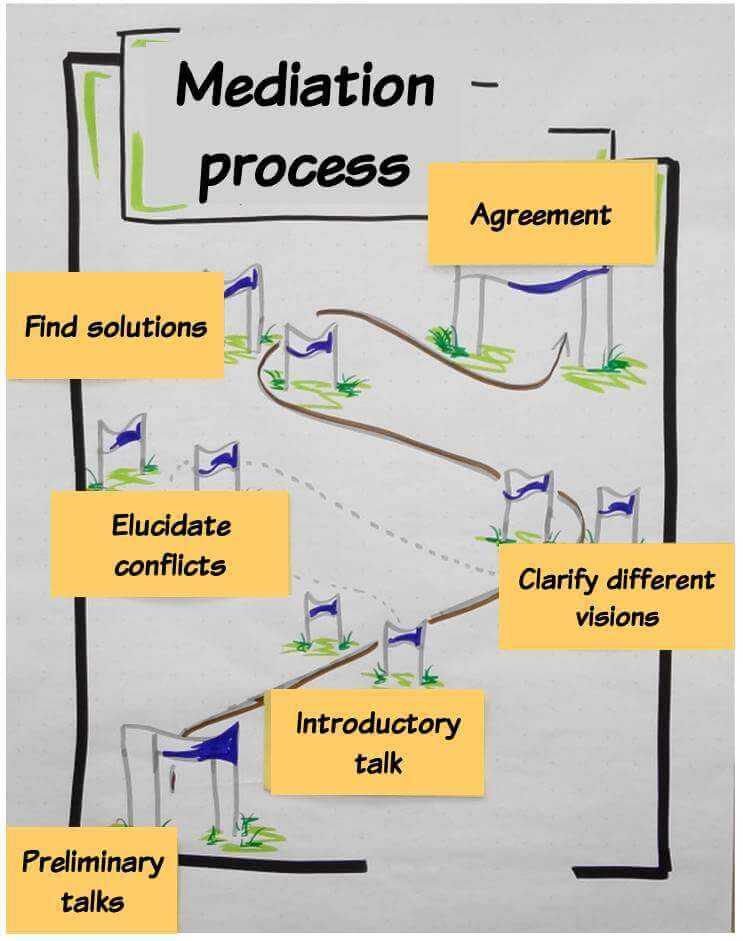Why You Should Consider Business Mediation

Running a business is demanding.
You need to think about a strategy to sustain and grow your business.
You need to handle the daily operations and manage employees
Face clients, sign contracts, provide after sales services.
But in a few times (fortunately not too often) a dispute raises either with an employee, between employees, with a client, or a supplier.
What to do in case of a business dispute? how to act as leader while protecting your business?
Keep in mind, a good lawyer/attorney will always stand with you.
But You might be wondering:
what's best for me: go to court or find an alternative dispute resolution process?
Let's see what does busines mediation do for you to help resolving these conflicts. it could save you money & time and much less stressful.
Let's dive in:
1.Business disputes resolution
Like paying taxes and integrating new technologies, business disputes are an inescapable part of running a business. It could be about a contract, a verbal agreement, or maybe a dispute with your labor force. You may even need to break ties with a long time business partner.
No matter the conflict, it can be overwhelmingly frustrating as well as emotionally and financially draining to get through. When things get heated, it can feel like the only way forward is a long, public, expensive court battle.
But luckily, there are methods to eliminate this kind of complication, where a peaceful resolution to your conflict can be found.
These methods begin with mediation.
2.What does mediation mean in business?
Mediation can help you settle your business dispute out of court.
At its core, mediation is a voluntary process where a neutral third party – the mediator – guides two or more parties in dispute through their conflict. The purpose of this semi-formal process is to ensure all parties’ concerns are heard, allowing them to generate their own solution via a productive dialogue.
Retaining the power to control the outcome of the conflict is just one of many benefits mediation has over litigation. It also saves time and money, is less adversarial, is confidential, and is structured in a way to maintain relationships and prevent reoccurrence.
The result of mediation is a written, signed agreement, which all parties agree is the most mutually beneficial solution.
2.1. The business mediation process: How does business mediation work?
Mediation is voluntary, so the first step in the process is getting both parties to agree to participate. Once mediation is chosen as the preferred method of conflict resolution, both parties must collectively decide on a mediator.
While all mediators have their own style, the basic structure of mediation is consistent.
Before the first mediation session is arranged, the mediator will need to be briefed, either by asking both sides to prepare a written summary of the situation for review or by scheduling individual meetings with each party to discuss background.
Once the details are collected, a session will be scheduled at a neutral location. This could be a boardroom, an office, or even a virtual meeting space. Before the session gets underway, the mediator will provide an overview of the process, so everyone knows what to expect.
Then, each party and/or their attorney will be given an opportunity to make opening statements.
Although the relationship may be strained, the right business mediator will be able to get both parties to communicate and identify common goals in an effort to reach an agreeable solution.
2.2. Business mediation benefits
There are a host of issues associated with traditional litigation. The time, cost, rigidity, and adversarial nature of court is answered by alternative dispute resolution (ADR), and more specifically, mediation.

A mail and phone survey of 528 of the largest U.S. corporations found that 81% consider ADR a more satisfactory process than litigation, and 90% view mediation as an effective cost-saving mesaure.
Neutral Expertise
The outcome of litigation is often unpredictable. While a seasoned judge may have the ability to quickly learn the details of the case and make generalizations, choosing to litigate still means giving up control to someone who will never have the time to learn the full complexities of the situation.
Worse yet, when lay people in a jury are involved, it is very difficult to preserve impartiality.
Turning to a trained neutral party, like a mediator, allows parties to maintain control of the outcome, while getting the benefit of professional assistance.
Cost
Even if you choose a high-priced, private mediator, the costs are far lower than litigation. You and the other party will share the cost, instead of paying your own lawyer. Not to mention, mediation is much faster than court, meaning there are fewer billable hours on the books.
In the same survey of major corporations mentioned above, results showed 90% considered ADR a cost control technique, and 54% said cost pressures affect their decisions to use ADR. The amount mediation can save is enormous. In fact, 11% of respondents saved over $1 million using ADR.
And, in general, mediation can save businesses 70% of the cost of going to court.
Flexibility
Everyone who steps into court is supposed to be treated equally. This is a vital principle in the function of the court system, but a ‘paint by numbers’ operation does not allow important nuances of each case to impact the outcome.
Mediation allows for greater flexibility. There is no limit to the innovation and ingenuity parties can display in reaching an agreement.
Amiability
One of the most valuable differences between litigation and mediation is that litigation is one party vs. another party, while mediation is one party working with another party to reach a mutually beneficial outcome.
This crucial difference could save your business relationship, instead of devolving it into total war. In fact, 59% of corporations say ADR ‘preserves good relationships’.
Confidentiality
Traditional litigation is a matter of public record. But everything you say in mediation is completely confidential. If your conflict involves sensitive topics or trade secrets, mediation is a better option.
Party Representation
In U.S. courts, businesses can only be represented by an attorney, forcing them to take on additional expenses when they decide to take a claim to court. In mediation, businesses can choose how they want to be represented. If you decide to represent yourself, you effectively cut costs and ensure familiarity with the case.
If you’re more comfortable with an attorney present, you can still take this option. And this guarantees you will have skilled representation. But either way, you can choose what works best for you and your situation.
2.3. How to find a business mediator
Once you and the other party have decided to mediate, it’s time to find a business mediator who is right for your case. Understand that this process will take some time. Not everyone who presents themselves as a mediator has equal quality training and experience.
Look for someone who has worked on business disputes in the past, and don’t be afraid to ask questions about cases they’ve mediated, where they were trained, whether they completed an apprenticeship, and how many hours of training they received before becoming a mediator.
These days, you can find just about anything online, and a great mediator is no different.
MediatorSelect is an online directory where you can view mediator profiles. If you want to make the right choice, this is a fantastic place to find the best business mediator near you.
To completely exhaust your options, you can also search the terms ‘mediation’ and ‘conflict resolution’ in your local phone book. Or, if you belong to a small business association, ask if they have a mediation program specializing in small business issues.
If budget is an issue, research whether your area has a community mediation centre. These types of resources offer low-cost mediation services.
3. Business mediation examples
Business mediation covers such a vast labyrinth of scenarios that no simple, straightforward definition can do it justice. Parties involved in a business case may be individuals, business owners, banks, contractors, insurance companies, trust companies, real estate owners, governmental bodies, or some combination of these.
There are also many types of cases that fall under business mediation. Let's examine some of them:
- Bankruptcy mediation
- Family business
- Employment mediation
- Insurance mediation
- Workplace mediation
- Real estate mediation
- Personal injury mediation
- Small business mediation
- Construction mediation
Next, will detail each of these business mediation practices:
3.1. Bankruptcy mediation
From 1980 to 2017, corporate bankruptcies averaged 45,686.15 per year. Needless to say, it is a common issue in business, and it often needs professional help to resolve.
Mediation can be used in a variety of bankruptcy cases, including those involving complex, multi-party issues. A large group of claims and preferences from a single bankruptcy can be compiled into an orderly process that allows for quick resolution through mediation.
Any court approvals needed during this process are generally quickly granted, since judges are happy to assist cases being resolved independently, rather than tying up their court.
3.2. Family business
The number of disputes related to family trusts have increased 43% to an all-time high (from 98 to 201). While these numbers represent the cases brought to court in the UK, the dramatic increase illustrates the added pressure court systems are facing with cases like these throughout the western world.
Mediation can provide relief to this stressed system. And because it’s collaborative in nature, mediation can help preserve relationships, which becomes even more important when business and family are combined.
3.3. Employment mediation
Unfortunately, issues of employment discrimination are relatively common. In 2017 alone, 84,254 employment discrimination charges were filed. Employment mediation offers more structure and guidelines than collective agreement grievance procedures to deal with these issues.
If a settlement is reached, the mediator (or one of the parties) will draft a term sheet of the basic settlement terms and any conditions. The document is created before adjournment of the mediation session where the settlement is reached. If administrative action, arbitration, or litigation is pending, the settlement allows for the immediate dismissal of the case when it is signed.
3.4. Insurance mediation
Worker’s compensation is supposed to cover 100% of medical costs for injured workers, in addition to payment for lost time after a 3 to 7 day waiting period. In 2014, the amount paid over 129.6 million covered employees was $6.8 trillion.
With so much money on the line, insurance disputes are common. But, because of the complex nature of these cases, the need for creative problem solving, and the clash of multiple fields of expertise, they are not well-suited to litigation. Insurance disputes are, however, one of the most ideal case types for mediation.
The one caveat to note is that it’s important to find a mediator who is well-versed in insurance law.
3.5. Workplace mediation
A recent national survey indicates mediation is becoming a popular tool for businesses to resolve conflict, with 65% of companies having used mediation at a 90% success rate.
There are many causes of workplace conflict, such as differing values, competition to attain power, economic shifts, interpersonal struggles, and more. Using mediation to resolve these issues can prevent the expensive, negative effects of workplace conflict, like turnover and absenteeism, while preserving relationships that are required to be ongoing.
3.6. Real estate mediation
Across the U.S., there were 26,950 real estate related trials in 2005. When home purchases are involved, it is not only a large financial investment, it’s a topic steeped in emotion, making it tricky to navigate.
These days, many real estate contracts provide mediation for home buyer-seller disputes. The buyer and seller are bound by this, but the real estate agent is not. This is because the real estate agent is not bound by the other terms of the contract (other than their commission) and does not have final say over the details of the sale. If a real estate agent does something improper, a separate lawsuit is needed to resolve this.
Real estate mediation cases are usually quick to resolve (within a day or two).
3.7. Personal injury mediation
Personal injury is a type of dispute that is already very common to mediate. In fact, 97% of personal injury cases settle out of court, mostly through mediation.
Related to business, personal injury cases most often come in the form of torts and injuries caused by defective products.
3.8. Small business mediation
Unfortunately, being threatened with legal action is common for small business owners, with 43% of them reporting receiving a threat or being involved in a civil lawsuit. Money and time can be difficult resources to find when litigation is pending, so if it is possible to convince the other party to mediate, it is preferable to do so.
If you belong to a small business association (e.g. chamber of commerce or the Better Business Bureau), ask for information regarding any mediation programs they offer that are tailored to small businesses. Many of them have options available.
3.9. Construction mediation
Disputes are ubiquitous in construction. And each year, there is more money on the line. From 2012 to 2013, the average claim value of construction disputes tripled to an average of 34.3 million.
Understanding the options available to them, mediation is routinely used in the construction industry to resolve disputes quickly while minimizing costs. In construction mediation, there is usually a brief joint meeting, followed by a move to separate caucus rooms, where mediators explain the process and their role.
4. Can we prevent business disputes?
Disputes are inevitable. So while businesses cannot expect to create a situation where they are completely free of worry, there are steps they can take to limit exposure. It comes down to putting procedures and policies in place to govern interactions with employees and other businesses.

For example, using forms with industry standard requirements and language, as well as having a clear set of standards for hiring and firing employees (that falls within regional employment laws), will make businesses less vulnerable.
5. Conclusion
While handling your first business dispute can be intimidating, try to remember that disputes are very common. As long as you follow best practices, there is no need to worry.
If the situation escalates out of your control, business mediation is a practical solution for an extensive list of business-related disputes. These include bankruptcy, family business, workplace conflict, and insurance disputes.
The process begins with the mediator collecting background information from both sides, followed by collaborative meetings that help both sides express concerns and reach an agreeable solution. Unlike litigation, mediation saves time, money, and allows for flexible, creative problem solving.
If you need a business mediator, MediatorSelect is a fantastic place to find a qualified mediator in your area. Click here to start browsing the directory.
Let us know in the comments if you’ve ever encountered a business dispute and how you handled it. What worked? What didn’t?



